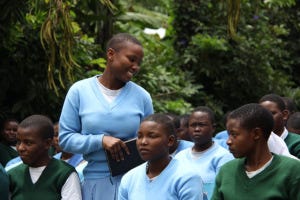
Five years ago, the United Nations designated October 11 as International Day of the Girl Child as part of their campaign to highlight the discrimination that girls around the world face every day. I grew up in Zimbabwe in the 1990’s and the first decade of the 2000’s, in a country that had after independence from white settler rule declared that education for all children — boys and girls — should be free. But as Zimbabwe faced economic decline, social services were cut, including the opportunity for free education at government schools.
I was one of the lucky few, part of a privileged elite. An only child, my parents prioritized my education above all else, sending me to one of the best private all-girls school in the country for my high school education, despite the massive increase in tuition fees that occurred almost monthly due to hyperinflation. As the country struggled to maintain its infrastructure, I would often study by candlelight on nights of prolonged power cuts. In my last year at school, supermarkets were often full of empty shelves, and my parents had to resort to the black market for imported food supplies from other countries.
And yet, these were minuscule challenges compared to what the rest of the country faced in those years, and still does. Across the country, and the continent, girls are often not given the choice to go to school because of parents forced to make an economic choice between educating their son or their daughter. When they do have the opportunity for an education, they lack access to basic resources that we here in the United States take for granted — books, stationary, new clothes, tampons.
While researching schools in the rural areas for my dissertation in journalism at Columbia University in 2013, I talked to girls who had to walk for several hours to get to the nearest school. When they did get home, they were exhausted, and had no time to read for pleasure or even do their homework because of the chores they had to do in order to help their parents. When girls do complete their education, they often lack the funds to make it to university, or find a skilled, paying job. They face domestic and sexual violence, discrimination in the workplace and legal systems, lack of governmental representation, access to basic resources, and violation of their human rights. Even when educated, they are not always empowered.
International Day of the Girl Child highlights all these issues, and brings the world’s attention to them. It strives to ensure that girls can grow in a safe and healthy environment into young women, with all the opportunities I was so fortunate to have both in the past and now. Today is a day to recognize strides that have been made towards gender equality in Africa and across the world, and to call for more to be done.
So how can we help with these efforts? We can volunteer and help out with non-profit organizations such as Asante Africa Foundation. We can sponsor a girl’s school fees for a year what we’d pay for our cell phone bill in a month. We can work with governments, we can become teachers, we can write and talk about all the challenges that girls face to raise awareness. We can try and figure out what the underlying problems challenging girls’ education are, rather than simply donating money that often doesn’t go to the right places. We can listen to girls and women, and make their voices heard. We can challenge the status quo that sees girls’ education as less important. We can help women to be both mothers and workers, daughters and students.
We don’t have to check our privilege — we can use it. — Trishula Patel
Trishula Patel is currently a PhD student at Georgetown University, focusing on African history. She has a B.A. and M.A. in history from the University of Pennsylvania, and an M.S. in journalism from Columbia University. She has written articles for The Washington Post, Philadelphia Inquirer, Philadelphia Weekly, PassBlue.
